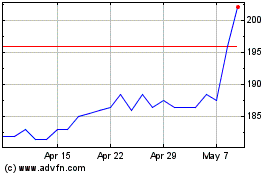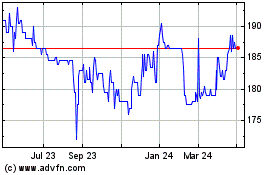BlackRock Income Portfolio Update
August 17 2022 - 6:09AM
UK Regulatory
TIDMBRIG
The information contained in this release was correct as at 31 July 2022.
Information on the Company's up to date net asset values can be found on the
London Stock Exchange website at:
https://www.londonstockexchange.com/exchange/news/market-news/
market-news-home.html.
BLACKROCK INCOME & GROWTH INVESTMENT TRUST PLC (LEI:5493003YBY59H9EJLJ16)
All information is at 31 July 2022 and unaudited.
Performance at month end with net income reinvested
One Three One Three Five Since
Month Months Year Years Years 1 April
2012
Sterling
Share price 10.4% 6.3% 4.4% 10.4% 16.2% 115.7%
Net asset value 4.2% -1.6% 4.5% 9.2% 17.3% 101.1%
FTSE All-Share Total Return 4.4% -1.2% 5.5% 9.9% 21.5% 97.8%
Source: BlackRock
BlackRock took over the investment management of the Company with effect from 1
April 2012.
At month end
Sterling:
Net asset value - capital only: 200.02p
Net asset value - cum income*: 201.66p
Share price: 196.00p
Total assets (including income): £46.7m
Discount to cum-income NAV: 2.8%
Gearing: 3.0%
Net yield**: 3.7%
Ordinary shares in issue***: 21,171,914
Gearing range (as a % of net assets): 0-20%
Ongoing charges****: 1.2%
* Includes net revenue of 1.64 pence per share
** The Company's yield based on dividends announced in the last 12 months as at
the date of the release of this announcement is 3.7% and includes the 2021
final dividend of 4.60p per share declared on 13 January 2022 and paid to
shareholders on 17 March 2022, and the 2022 interim dividend of 2.60p per share
declared on 22 June 2022 with pay date 1 September 2022.
*** excludes 10,081,532 shares held in treasury.
**** Calculated as a percentage of average net assets and using expenses,
excluding performance fees and interest costs for the year ended 31 October
2021.
Sector Analysis Total assets (%)
Support Services 12.3
Pharmaceuticals & Biotechnology 10.0
Oil & Gas Producers 8.4
Household Goods & Home Construction 7.8
Media 7.3
Life Insurance 5.8
Banks 5.7
Mining 5.1
Financial Services 4.6
Tobacco 3.4
Nonlife Insurance 3.3
Health Care Equipment & Services 2.6
Personal Goods 2.6
Electronic & Electrical Equipment 2.5
Travel & Leisure 2.4
Food Producers 2.3
General Retailers 1.7
Fixed Line Telecommunications 1.5
Gas, Water & Multiutilities 1.3
Industrial Engineering 1.1
Software & Computer Services 1.0
Electricity 0.8
Real Estate Investment Trusts 0.7
Net Current Assets 5.8
-----
Total 100.0
=====
Country Analysis Percentage
United Kingdom 85.8
United States 4.6
France 3.8
Net Current Assets 5.8
-----
100.0
=====
Fund %
Top 10 holdings
AstraZeneca 7.5
Shell 6.8
RELX 5.2
Reckitt Benckiser 4.8
Rio Tinto 3.8
Phoenix Group 3.7
British American Tobacco 3.4
3i Group 3.0
Rentokil Initial 2.9
Standard Chartered 2.8
Commenting on the markets, representing the Investment Manager noted:
Performance Overview:
The Company returned 4.2% during the month, modestly underperforming the FTSE
All-Share which returned 4.4%.
Global equity markets rose in July despite global economies feeling the impacts
of both high inflation and Central Banks' attempts to curb it. Central Banks
have continued to raise rates; the Fed by 75bps for the second consecutive
month and the European Central Bank (ECB) by a larger than expected 50 basis
points, marking the first ECB rate hike in 11 years1.
The US economy has slowed for two consecutive quarters technically putting the
US into a recession. Sentiment shifted during the period towards the view that
inflation was close to peaking enabling more dovish monetary policy in due
course. This prompted a recovery in global equities after heavy year-to-date
losses. Global growth stocks rallied and outperformed value stocks by 6.9% over
the month. Year-to-date, value stocks have still outperformed growth stocks by
12.8%2. The S&P 500 rose 9.1%, its best monthly performance since November
2020. The Nasdaq rose 12.3%, its biggest monthly gain since April 20201 and
highlighting the outperformance of information technology stocks more broadly
over the month.
The outlook for European economies remains unclear given the potential for
further gas disruption, the risk of energy rationing and its subsequent impact
on industrial production. Gas supplies benefitted from the reopening of the
Nordstream 1 pipeline, albeit at a limited capacity. However, this was followed
by Russia's announcement that capacity would be further reduced to enable
turbine repairs. Germany rejected this explanation, causing gas prices to rise
sharply towards the end of the month in response to renewed fears of gas supply
scarcity.
Emerging markets underperformed, with a -0.2% decline of the MSCI Emerging
Markets Index2, largely due to China's heavy weight in the index. China has
shown few signs of softening the zero-covid policy with rolling lockdowns still
enforced across various cities. However, positive actions were seen as Beijing
opened borders for direct inbound passenger flights for the first time in two
years and exports have significantly beaten expectations.
Boris Johnson resigned as the UK's Prime Minister after losing the support of
his party. The Conservative leadership race was narrowed to Rishi Sunak and Liz
Truss. However, the UK economy is more sensitive to global forces than the
fiscal spending plans of candidates.
Stocks:
The Company's more cyclical holdings, including RS Group and Rentokil,
performed better during the month, helped by solid reporting. RS Group
delivered strong results; while the market continues to be worried about the
macro backdrop, the company continues to deliver strong growth benefitting from
its long term investments in people, technology and product breath made over
several years. Rentokil, a long-term holding for the Company, is expecting the
completion of the Terminix deal in the next couple months which we believe will
enhance the long-term growth opportunity giving them greater density in their
existing footprint whilst opening up new geographical markets in the US to gain
share. 3i continued to execute strongly, delivering an encouraging update, once
again highlighting the continued strong performance of Action, its European
discount retailer. Whilst we remain cautious on the backdrop for the consumer,
it is clear that Action has built a strong value- based economic model and
acquired a loyal and growing customer base.
Direct Line Insurance was the top detractor from performance during the period.
The company fell after issuing a profit warning as claims inflation has moved
ahead of pricing in the short term. We believe this is towards the bottom of
the motor cycle and we would expect the industry to raise prices in the medium
term to protect profitability. Smith & Nephew also detracted as a defensive
share on a weak second quarter print which highlighted ongoing supply chain
challenges partly as a result of COVID challenges and some self-inflicted
operational issues. We continue to engage with the new CEO on his plans to
improve execution. BT fell in part due to the defensive nature of the shares
and the concern over the threat from competitors building out broadband network
infrastructure.
Portfolio Activity:
Trading was limited ahead of results reporting. Following further
disappointment around the company's control of its cost base, we sold the
remaining holding in IntegraFin.
Outlook
The headwinds facing global equity markets have grown steadily over the first
half of 2022. Inflation has surprised in its depth and breadth so far, driven
by ongoing COVID related disruption, the war in Ukraine, rising labour costs
and the persistence of these factors. Central banks and governments are
tightening monetary and fiscal policy as interest rates rise and stimulus is
withdrawn. The subsequent rise in the risk-free or discount rate has many
consequences, not least the pressure on valuation frameworks and, notably, on
un-profitable or extremely highly valued businesses. We are mindful of this and
feel it is incredibly important to focus on companies with strong, competitive
positions, at attractive valuations that can deliver in this environment.
The political and economic impact of the war in Ukraine has been significant in
uniting Europe and its allies, whilst exacerbating the demand/supply imbalance
in the oil and soft commodity markets likely pushing inflation higher for
longer. We are conscious of the impact this will likely have on the cost of
energy, and we continue to expect divergent regional monetary approaches with
the US being somewhat more insulated from the impact of the conflict, than for
example, Europe. Complicating this further, is the continued impact COVID is
having on certain parts of the world, notably China, which has used lockdowns
to control the spread of the virus impacting economic activity during the first
half. We also see the potential for longer-term inflationary pressure from
decarbonisation and deglobalisation. It is difficult to have a high degree of
confidence in how these evolve but we believe there is rising risk of a policy
mistake as central banks attempt to curb inflation; too late to tighten and/or
tightening too hard. We expect this, and the geopolitical ramifications of the
Ukraine war, to be the prevailing debate of 2022 and beyond.
Although demand remains strong at present, the outlook for corporate revenue
and earnings growth is likely to worsen over the course of 2022 as the pressure
on real incomes raises the spectre once again of stagflation. A notable feature
of our conversations with a wide range of corporates in 2021 was the ease with
which they were able to pass on cost increases and protect or even expand
margins. We believe that when the transitory inflationary pressures start to
fade (e.g. commodity prices, supply chain disruption) then pricing
conversations will become more challenging. We are also increasingly focused on
wage inflation which may be more persistent and yet, in our experience, harder
to pass on. Corporates have already pointed to wages picking up, the
introduction of bonuses and growing pressure on employee retention rates as
competition for labour intensifies. We therefore believe that employee
retention will be an important differentiator in 2022 given the productivity
benefits of a stable workforce as labour markets tighten further.
The FTSE 100, with a majority of international weighted revenues, high
commodity weighting and low starting valuation, has proven to be a port in the
storm, as one of the best performing developed markets during the first half.
The FTSE 250, with its higher domestic focus and lower liquidity has suffered
given the weakness in the domestic economy. We would expect the FTSE 100 to
continue to be advantaged until we see a stabilisation in the domestic economy
and subsequent strengthening of sterling or, more likely, a weakening of the
dollar. Whilst we anticipate further volatility ahead as earnings estimates
moderate, we know that in the course of time, risk appetites will return. We
are currently spending time identifying our 'wish list' of opportunities
utilising our flexible approach, experience and strong absolute valuation
framework.
As a reminder, we continue to concentrate the portfolio on businesses with
pricing power and durable, competitive advantages as we see these as best
placed to protect margins and returns over the medium and long-term. Further,
we continue to have conviction in cash generative companies with exceptional
management teams and underappreciated growth potential. At present, whilst we
are excited by the attractive stock-specific opportunities on offer, we
continue to approach the year with balance in the portfolio.
1 Source: July 2022, Financial Times https://www.ft.com/content/
37e49144-2b1d-45f1-9516-73cda646261d
2 Source: July 2022, JP Morgan Monthly Market Review Monthly Market Review |
J.P. Morgan Asset Management (jpmorgan.com)
17 August 2022
END
(END) Dow Jones Newswires
August 17, 2022 06:09 ET (10:09 GMT)
Blackrock Income And Gro... (LSE:BRIG)
Historical Stock Chart
From Mar 2024 to Apr 2024

Blackrock Income And Gro... (LSE:BRIG)
Historical Stock Chart
From Apr 2023 to Apr 2024
